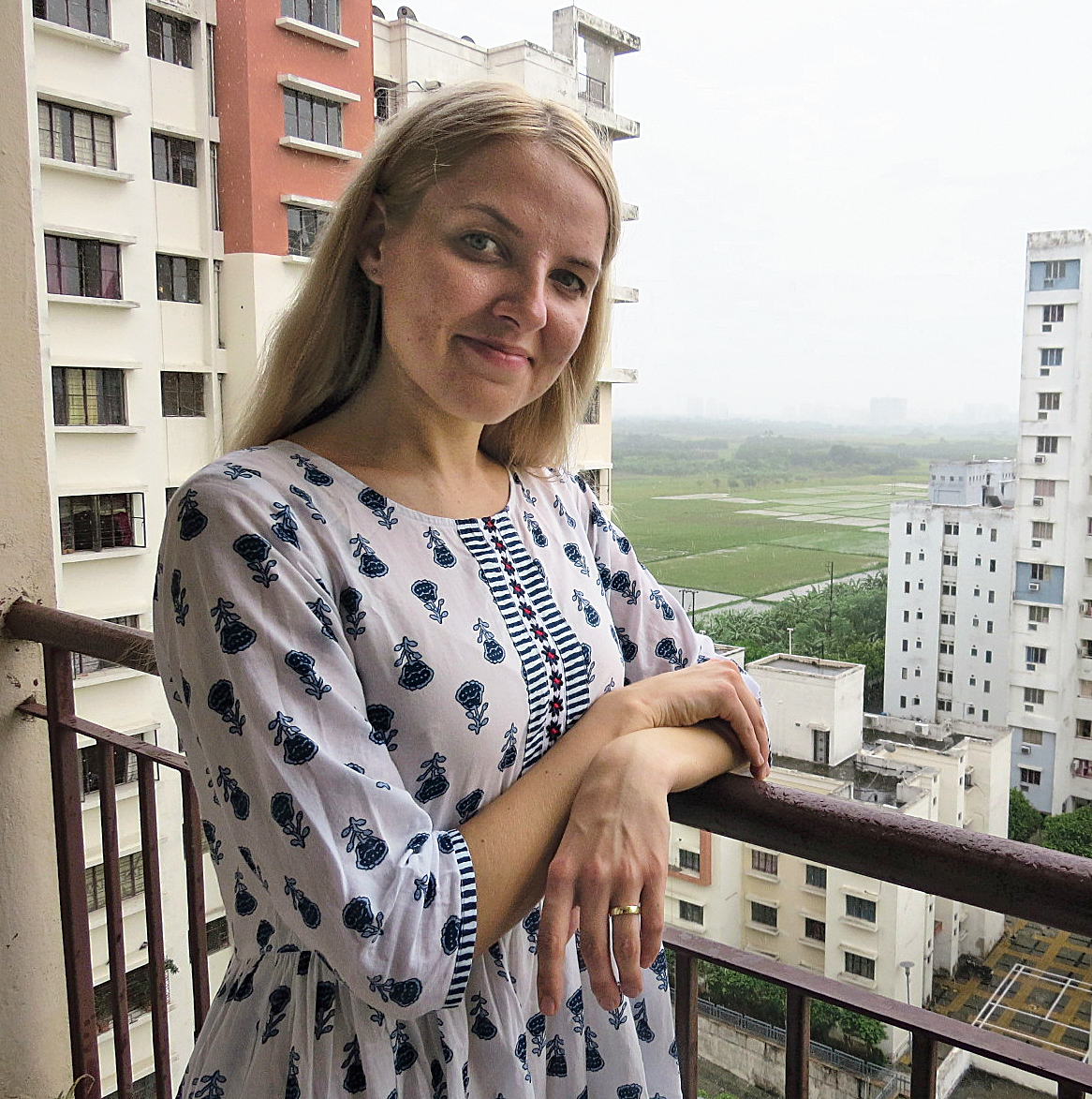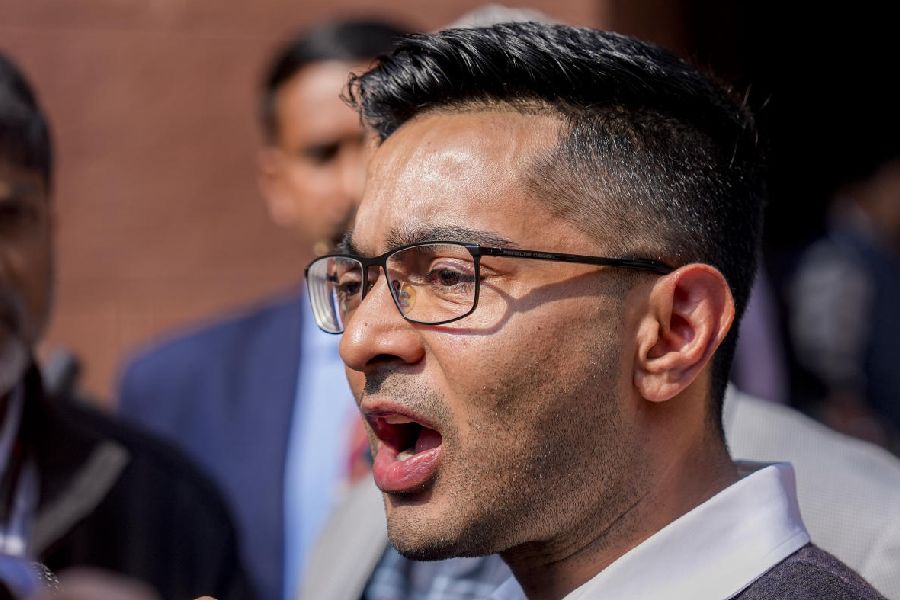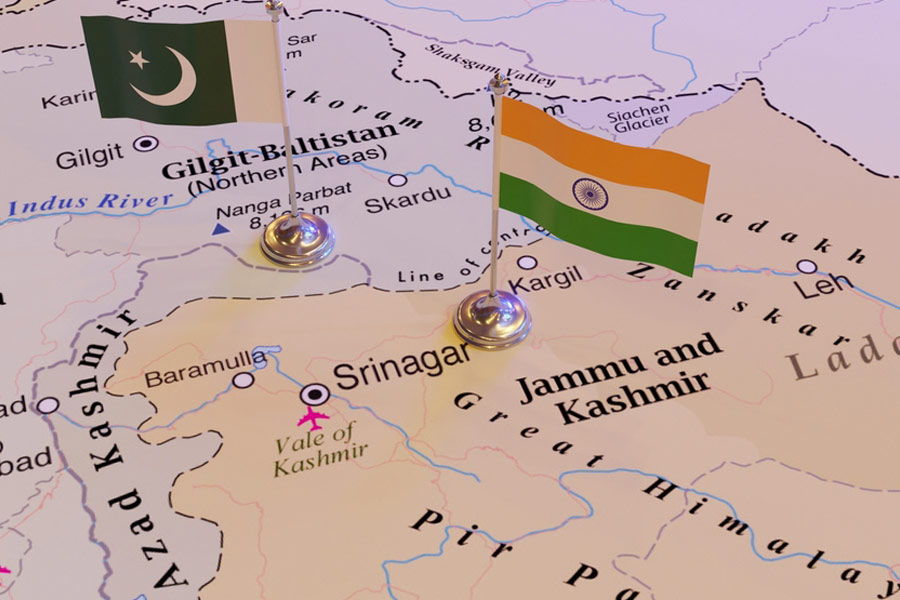A tourist to the city — that too a girl on a solo trip — hardly ever chooses a slum to spend nights in just to see what it is like. But Samanta Galinaityte wanted to experience the “real India”. That was 2017. She has been back twice more and has even chosen a Calcutta-based subject for a research project that required her to spend two months here.
Till she left town recently, Hiland Willows in New Town had possibly the city’s only Lithuanian national in residence. Samanta was here to do a project on women’s empowerment for her Master’s degree in Contemporary Asia Studies at Vilnius University. Her chosen area was the state government’s Kanyashree scheme.
Samanta’s interest in India, and specifically Calcutta, took seed in her childhood. “When I was 11, someone from Iskcon sent me a mantra on Skype, saying it would fulfil my desires. At that age I must have been wanting a Barbie doll or a bicycle. I chanted the mantra for some time and got none of that. So I told him: ‘This mantra does not work.’ I also Googled Krishna. But there was no information in Lithuanian.”
Her first “real touch” with India was through the film Slumdog Millionaire. The horrible living conditions depicted in the film were an eye-opener. “I watched it many times and showed it to anyone who came home. I felt a connection with that film. I also tried to find information on India.”
By Class VIII, Samanta knew she wanted to learn about Asia. And when she was in Class XI at the gymnasium, which in Lithuania is a special school to prepare for university, she heard of the Indology course offered at Vilnius University. “By then, I was preparing to learn as much about India as I could. My parents were sceptical about my passion for India. In fact, Mom was worried that I would leave for India and marry there.”
Getting into Vilnius University was tough. But she did. There were 12-13 pupils in the Indology class. “In the first year, we had to learn two languages — Sanskrit and Hindi. Our Sanskrit teacher was very strict and many dropped out. It was so tough that I was often in tears. You had to have real passion for the subject to carry on.” At the end of the first year, only five students remained. Of them, two switched to other subjects.
Samanta’s favourite area was contemporary Indian history, starting from British India. She also found Sanskrit literature “super interesting”. It helped that Lithuanian is the closest extant sister language of Sanskrit. “Our teacher Professor Vytis Vidunas (who has recently brought out a compilation of 108 words common to Sanskrit and Lithuanian) was my Muse. We were taught Sanskrit for a year and Hindi for four years.”
In 2017, she decided to visit India on a self-funded trip. She put up in BC Block, “near panitanki 3”, working as a teacher in a slum school in Ultadanga for an NGO. “I wanted to see how local families lived. So I went to stay with some colleagues who lived in a slum near the rail station, called Basanti Colony.” She is unlikely to forget the experience. “I hadn’t seen a cockroach in my life and nobody had warned me that they could fly. They didn’t have a washroom and I had to wash in the streets. People stared…” Samanta breaks off at this point. “Now I think I must have been crazy!”
She got another taste of reality when visiting a homeless family on BT Road, where she was bitten badly by mosquitoes.
Samanta says she did not get a culture shock. “People had warned me that I would see horrible things and I’d be sad. But I realised that being sad would not change anything. So I did not get emotionally involved.”
Her second visit was in February 2018 when she stayed for three weeks in Rajarhat. “I was researching for my bachelor’s degree on the impact of NGOs and the government on the daily life of slum women.” The slums she chose were in Tiljala and Tangra. One was a Hindu slum and the other a Muslim one where mostly ragpickers stayed. “The second lot were not too friendly and their lives were harder. It took me time to build their trust.”
In university, her spoken Hindi had been scrappy due to lack of practice. But in India, she put it to good use in her interactions.
The streets here, she feels, are a man’s world. “Everyone stares at you.” But she has never felt unsafe other than an incident in a crowded bus when someone touched her inappropriately. “I got off the bus and screamed out the choicest Hindi slang I knew. I still remember the shock on the man’s face.”
Samanta believes that local clothes are her armour. “In India, if you wear traditional local clothes you are treated respectfully. I feel safe in the kameez I wear.”
She also feels Indian women are united. “Once I was carrying a heavy bag and a woman offered me a seat.”
But her biggest problem on her third visit has been getting accustomed to having a maid clean up at the apartment she was sharing with a friend. “I am brought up to be responsible for the mess I create. So having her clean it was strange. I treated her as an equal from the start yet she would not look me in the eye.” After three weeks, Samanta’s effort to break the ice bore fruit and she started smiling and talking to her.
Samanta believes it is because Indians are used to having others clean up at home that they litter the streets. “The city has beautiful architecture, Bengali people are so friendly. Yet the streets are dirty.”
Her research on this trip was funded by the chancellor of the ministry of foreign affairs and the honorary consul of Lithuania in Calcutta. “I did surveys on how Kanyashree helps adolescent women get empowered.” She interviewed 70 girls in three schools in Rajarhat and Gaighata. “The scholarship really works. It has reduced drop-outs and child marriages. Girls are proud to be under Kanyashree.”
Back home, she has to defend her thesis in 2020 and join the job she has already secured in the foreign affairs office. “I will be back in Calcutta at the first available chance,” the 23-year-old smiles.











